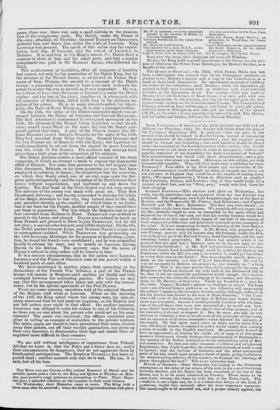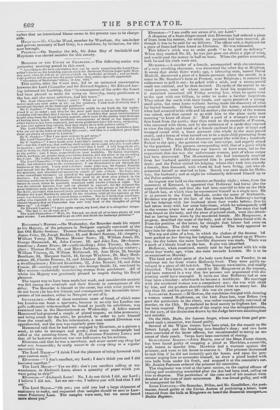the Yeomanry Regulation Bill. It propeses " that the arms
of the several corps should be lodged in district depots, instead of remaining
in the possession of the individual members ; that the separate corps should be formed into battalions ; that each battalion should be placed under the command of the Lord-Lieutenant of the county, who should
be empowered to call them out only its cases of emergen,:y, without the
especial command of his Excellency the Lord-Lieutenant of Ireland." This announcement was heard with much dissatisfaction ; and a pro- mise of some alterations was made. Ministers, on this subject, act with inconceivable stupidity. Why will they make such a stickling for these Yeomanry ? Four-fifths of the Irish people and six-sevenths of the Irish representatives would willingly see them all hanged, and there are not ten men in England that would be at the trouble of cutting them down. (We speak figuratively.) Whom do Ministers seek to gratify ?
The Farnhams, Rodens, and Lortons ; who, if they would kneel for a century at their feet, and cry " Pray, pray," would only kick them for their cringing.
GRIMSBY Euncrsosa—This election took place on 'Wednesday, last week, but the particulars had not appeared when our last Number was published. The candidates were.Lord Loughborough, son of the Earl of
Rosslyn, and the Honourable Mr. Fitzroy, Anti-Reformers ; and Captain Maxfield and Mr. Kerr, Reformers. The first two were elected ; an issue which might have beets foreseen. We certainly did not expect that old Mrs. Grimsby would so soon be reconciled to the party which had deprived her of one of her sons, nor that her worthy freemen would feel much affection to that cause which lopped off one half of the sources of their septennial jollification, and grievously trenched on the monopoly of the other. It is not unamusing to mark the bearing of the Anti-Reform candidates and their bottle-holders. A Mr. Brown, who proposed Cap- tain Fitzroy, gravely told his bearers that the borough, under the Bill, was to be given up to Sir Richard Sutton, Lord Carrington, and the sur- rounding lauded proprietcirs; Mr. Brown had actually taken it for
granted that the aged lady's honours were to be thrown open to the neighbouring hundreds ! A Mr. Bell had previously assured the elec- tors, that though Lord Loughborough could do nothing for them in the Commons, where the Bill was sure to be carried, he would get his father to revise their case in the Lords ! The most singular speech, however, made on the occasion, was that of Lord Loughborough. He said he was not an enemy to Reform altogether—he was friendly to " a little Reform." This is the same person who, in his canvass for the town of
Kinghorn in Scotland, declared the only fault of the Ministerial Bill to be, that it did not extend the qualification widely enough. Our readers may remember the admirable showing-up of his conduct and his profes- sions, by Mr. Barclay, of that;town. Verily his Lordship is a man for
the times. Captain Maxfield's address we shall put out record. 'We hope such a sensible and honest profession as the following will recommend
the gallant Captain to the attention of some maiden borough, although it did not procure him favour in the eyes of Dame Grimsby. " He knew that nith some of the freemen, the plan of Reform now before Parlia- ment was unpopular, because it would partially interfere with the exer- cise of the privileges they were now possessed of ; he would slot, how- ever, shrink front the avowal of his approbvtion of that measure, and of his intention, if elected, to support it. But he must also add, he was desirous of obtaining a seat as an advocate of the principles of free trade, and an opponent of all those monopolies which fettered the industry of the empire. He had spent many years in India, and he knew that a
wise and liberal system of commercial policy would render that country a mine of wealth to the English merchant. He particularly desired to
have an opportunity of lending his feeble aid in support of that great measure which must shortly undergo the consideration of Parliament— the opening of the Indian Archipelago to the enterprising spirit of Thi- tish commerce. By that and other measures ef a liberal and enlightened Legislature, they might hope that the obstructed channels of trade would be opened ; that the harbour of Grimsby, and the other commercial ports of the isle, would again present a forest of masts, giving facilities to the manufacturing industry of time country, to dispense the blessings of plenty throughout the laud." This is no every-day man.
Maxon. or GRIMSDY.—Some discussion has ensued in the Commons consequent on the delay of the return of the writ in the case of the Great Grimsby election, and the Mayor has been examined at the bar of the House, and is to be again examined on Tuesday. There seems to he some doubt whether the blame lie with him or the Town-Clerk. The complaint is not a light one, for it is evident that delays of the kind, if numerous, might very seriously affect the most important measures. The causes ought to be searched out, and a proper remedy applied, the
rather that no intentional blame seems in the present case to be charge- able.
HAL1FAX.—Mr. Charles Wood, member for Wareham, the son-in-law and private secretary of Earl Grey, is a candidate, by invitation, for this mew borough.
PEEBLES.—On Tuesday the 9th, Sir John Hay of Smithfield and Baystoun was elected member for this county.



























 Previous page
Previous page